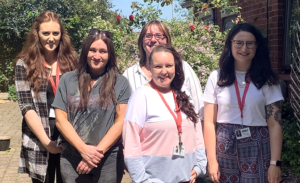How have our services adapted to the lock down – Willow House
 We spoke to Deborah Webster, service manager at Willow House, on how our crisis houses have continued to provide care despite the lockdown. Willow House took in new referrals and provided high quality recovery care while keeping both staff and guests safe in line with government guidance.
We spoke to Deborah Webster, service manager at Willow House, on how our crisis houses have continued to provide care despite the lockdown. Willow House took in new referrals and provided high quality recovery care while keeping both staff and guests safe in line with government guidance.
Willow House is a crisis house that has been open for 3 years and it has always been a fast paced service. We offer provide a unique alternative to psychiatric hospital admission and address the needs of people experiencing a mental health crisis. We are proud of the relationships guest build together as peers and with our staff.
Usually people referred to us stay up to a week in our house with their own room and have several sessions a day with a recovery worker. Since the Covid-19 outbreak we have adapted to quickly and moved to a virtual service for guests. We have telephone and video call support 24 hours a day so guests can contact our staff any time they require support. We offer the same catalogue of interventions previously done face to face but in a safe way for both staff and guests.
We practically changed all our processes overnight to accommodate this. For new referrals we use an NHS screening tool to ensure people don’t have symptoms or haven’t been exposed to people with symptoms.
 We practically changed all our processes overnight to accommodate this. For new referrals we use an NHS screening tool to ensure people don’t have symptoms or haven’t been exposed to people with symptoms. There are times slots for rooms so guests can still enjoy Willow House while maintaining social distancing. All our staff in the house wear masks, keep two metres apart and can’t spend more than 15 minutes face to face with other people. Some staff now work from home which has taken its toll due the isolation but I think overall we are a stronger, more resilient team.Our recovery workers have taken steps to help people we support with the transition to the new virtual methods. Staff are more casual and conversational over the phone. This new communication style helps guests feel comfortable and engage better with the intervention.
We practically changed all our processes overnight to accommodate this. For new referrals we use an NHS screening tool to ensure people don’t have symptoms or haven’t been exposed to people with symptoms. There are times slots for rooms so guests can still enjoy Willow House while maintaining social distancing. All our staff in the house wear masks, keep two metres apart and can’t spend more than 15 minutes face to face with other people. Some staff now work from home which has taken its toll due the isolation but I think overall we are a stronger, more resilient team.Our recovery workers have taken steps to help people we support with the transition to the new virtual methods. Staff are more casual and conversational over the phone. This new communication style helps guests feel comfortable and engage better with the intervention.
We are commissioned to provide a crisis service for people in Lancashire and we will provide it.
I didn’t think I’d face new challenges such as dogs barking over skype or parrots chirping during a telephone intervention but I think everyone will agree the pandemic has bought a new perspective to everything. We are focusing on our own wellbeing as individuals and a team so we can cope with these tough times. Some staff said they struggled with separating work from home. Together we have agreed that staff do not have to fill the day and that taking time out for themselves during the day is important. Screen time has shot up and people’s homes aren’t offices. Overall everyone has adapted well to the changes and new working routine.
We are commissioned to provide a crisis service for people in Lancashire and we will provide it. For a crisis house to stop during a crisis would be the last thing we want. We assessed the risks to our staff and guests and adapted the service as necessary. The hard work and dedication of the staff to keep the people we support on their recovery journey cannot be overstated.
We want people to know that our they can still access our service as an alternative to hospital admissions. In a time of high anxiety and uncertainty we will be there for those in a mental health crisis.

















